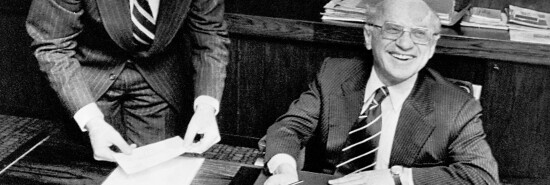
Milton Friedman’s wisdom
Jack Elbaum
Video Embed
Today marks what would be Milton Friedman‘s 111th birthday. Not only the wit, but more importantly the wisdom, he brought to political and economic conversations ought to be admired to this day.
Friedman, the famous free-market economist and theorist, was a pioneer of school choice. In a 1955 paper titled “The Role of Government in Education,” he recognized the dangers of a government monopoly in education. He wrote: “Government, preferably local governmental units, would give each child, through his parents, a specified sum to be used solely in paying for his general education; the parents would be free to spend this sum at a school of their own choice, provided it met certain minimum standards laid down by the appropriate governmental unit.” Why is this preferable? Because education policy should “center attention on the person rather than the institution.” In today’s parlance, it means “fund students not systems.”
HUNTER BIDEN INVESTIGATION: DOJ BACKS DEVON ARCHER TESTIFYING, REJECTS OBSTRUCTION CLAIMS
He has been more than vindicated. The state of the traditional public school system is a mess today because of the incentives inherent to it while school choice is expanding as ever more parents, on both sides of the political aisle, realize that it is the proper way forward.
Numerous pieces have already pointed out that Friedman would have almost certainly been pleased with the direction of education policy over the past few decades. The Foundation for Economic Education’s Kerry McDonald points out that, today, “roughly 18 million U.S. students, or 37% of the K-12 population, have or will soon have access to private school choice options in their state.”
Friedman also saw precisely where ideas about “the social responsibility of business,” today referred to as “stakeholder capitalism,” would lead. In a 1970 essay in the New York Times, he wrote that “the doctrine of ‘social responsibility’ taken seriously would extend the scope of the political mechanism to every human activity. It does not differ in philosophy from the most explicitly collectivist doctrine.”
It is an almost prophetic statement. The precipitous rise of environmental, social, and governance standards and diversity, equity, and inclusion initiatives in corporate life has had exactly the effect Friedman said it would — in a time before those specific phrases were ever even created. He was right that politics would become infused into everything. And nobody is better off for it.
Last, his deep understanding of pure economics was nearly unmatched. There is a reason Friedman won the Nobel Prize — and it was not for his political commentary. His analysis of monetary policy and the business cycle is more relevant today than ever before.
He was one of the economists who renewed appreciation for the quantity theory of money, and its associated “equation of exchange,” which posits, in its most simple form, that there is a positive relationship between money supply and price level. As such, we can understand fluctuations in inflation as a consequence of imprudent monetary policy.
A graph published in the Wall Street Journal last year shows expected inflation based on the quantity theory of money equation plotted next to actual inflation as measured by the GDP deflator over the past 60 years — and the results are nearly perfect. If only the Federal Reserve in 2020 did not just flood the system with money, we may have been able to avoid the significant inflation we experienced over the past few years. In other words, if only we had listened to Milton Friedman.
As one of his students, Thomas Sowell, wrote years later, “Intellect is not wisdom.”
But it is clear that Milton Friedman had both.
Happy birthday.
CLICK HERE TO READ MORE FROM THE WASHINGTON EXAMINER
Jack Elbaum is a summer 2023 Washington Examiner fellow.
